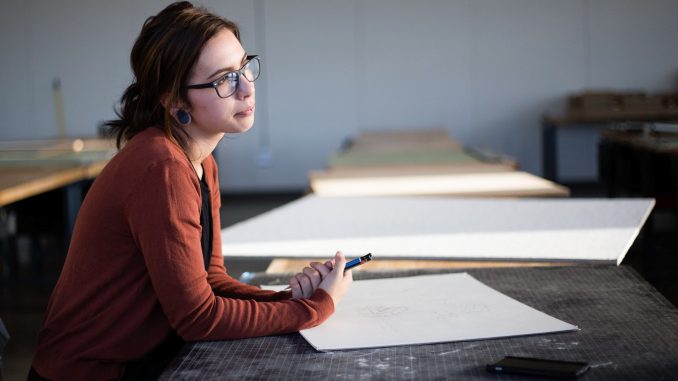
Maryam Hallaj’s family knew they had to leave Syria as soon as it became unsafe for her and her brother to attend school because of the Free Syrian Army’s approach toward her hometown.
Hallaj, a senior architecture major and Syrian refugee, won a $5,000 scholarship from GlaxoSmithKline, a pharmaceutical company, in May. She was chosen for the award to “improve lives through higher education,” and hopes to design refugee “pop-up spaces” — housing for refugees — after graduating.
Hallaj said she has always been interested in space.
“I lived [in Syria] for five years and I didn’t speak the language well … so not being able to connect with people over language was always difficult,” Hallaj said. “I always understood how people worked and connected to each other through space.”
Born in San Jose, California, Hallaj and her family moved to Arizona when she was two and lived there until she was 11. Before she started sixth grade, her family moved to Aleppo, Syria.
Her father, who is Syrian, had family and a business in the country. He also wanted his family to experience the culture, she said.
“It’s really hard to be uprooted and move to somewhere that you are not familiar with the culture and language or anything,” Hallaj said.
Because she wasn’t fluent in the Arabic language, she said she struggled to connect with people culturally.
“It took me longer to make friends, do anything school related,” Hallaj said. “It is a lot to drop everything when you’re 11 and everything is perfect and start over in a new country.”
When her family heard news that the Free Syrian Army declared they were going to seize Aleppo, they decided it was time to head back to the United States.
Because her family members had dual citizenship, it was easier to travel by plane back to America. With one week’s notice, her family packed one suitcase full of five outfits and some objects that they couldn’t live without, Hallaj said.
“We didn’t do anything to the house, we just packed and left,” she said. “We got out and a few weeks later the airports closed.”
When they arrived in Pennsylvania, they didn’t have a place to live right away. For two weeks, they stayed in a hotel and then later lived in her dad’s office and garage, sleeping on air mattresses. Eventually, they found a home in the Philadelphia area and Hallaj enrolled in Upper Merion Area High School.
Hallaj said one of the hardest parts about transitioning back into American culture was attending a public high school for the first time.
“I didn’t know how people worked,” Hallaj said. “I didn’t know what people were thinking, which was kind of for the best because I wasn’t afraid to just be myself and say whatever.”
During her time at Temple, Hallaj has kept busy. She is on the board of Temple’s chapter of the American Institute of Architecture Students. She founded the Temple chapter of Architecture Lobby and volunteers with the Narenj Tree Foundation, an organization assisting refugees.
She also applied to nearly 200 scholarships, she said.
When she found out she won the GSK Opportunity Scholarship for pursuing education despite facing adversity, Hallaj said she wanted to cry.
“I worked really hard to get myself through school and so has my family and to think that I’ve come all this way, I’m really proud of myself,” she said.
After she graduates in May, Hallaj hopes to pursue her designs of refugee pop-up spaces that she began sketching at the end of the Spring 2016 semester.
Her current sketches plan to use shipping containers as a base for the shelters, which can be set up in different locations. She hopes by using shipping containers, the pop-up spaces can be easily brought to different ecosystems and recycled.
Adam Hallaj, Maryam’s brother, believes this design is much more practical for refugees.
“Refugees need something more than temporary,” Adam Hallaj, a sophomore biology major, said. “And this is the perfect solution because it gives them something longer to stay in and it is the little things like that when you have lost everything.”
Maryam Hallaj said the designs are a response to her realization that she should use her architectural knowledge to help people.
“I decided I should shift my attention from making really beautiful buildings to making spaces that make happy beautiful people instead,” she said.
Emily Scott can be reached at emily.ivy.scott@temple.edu.


Be the first to comment